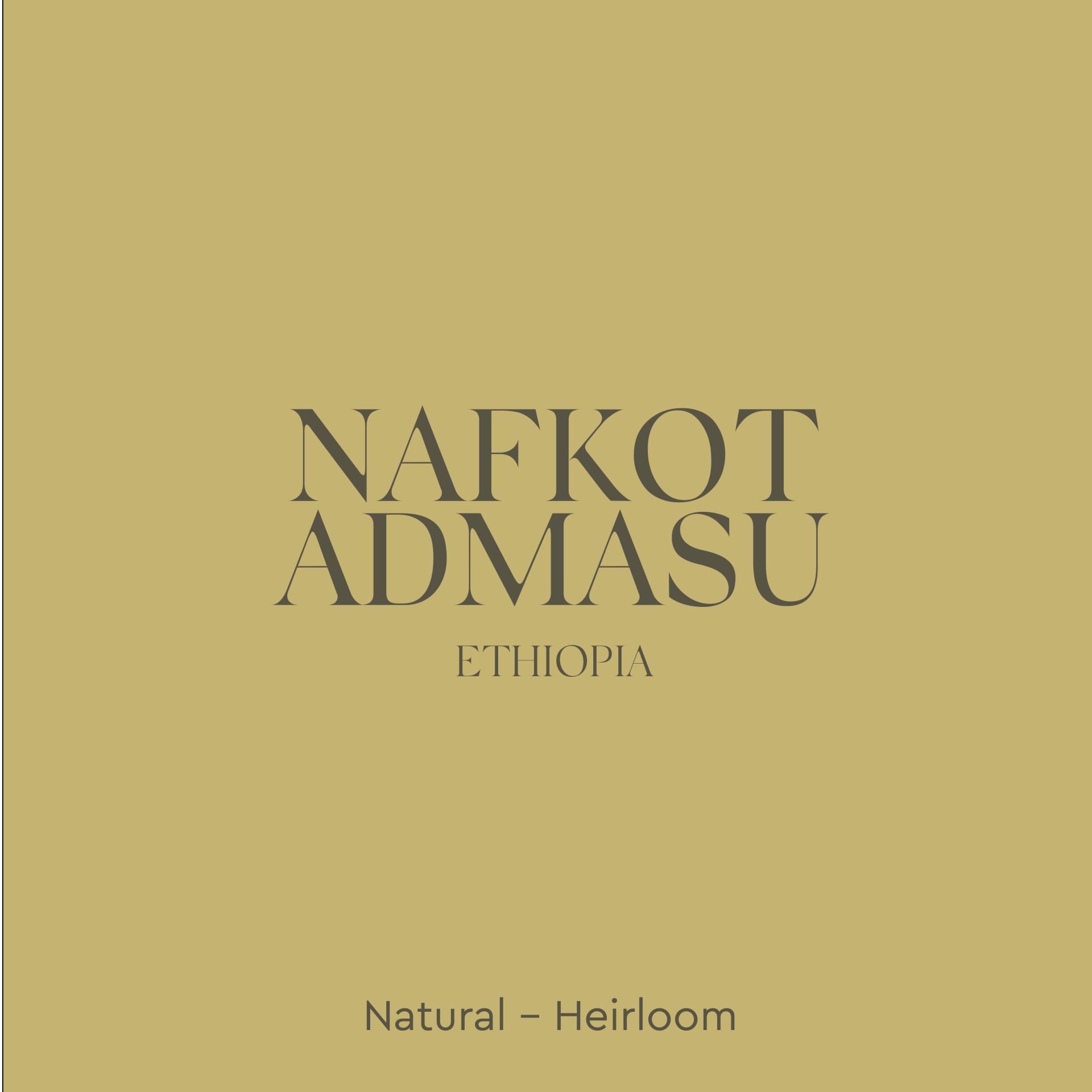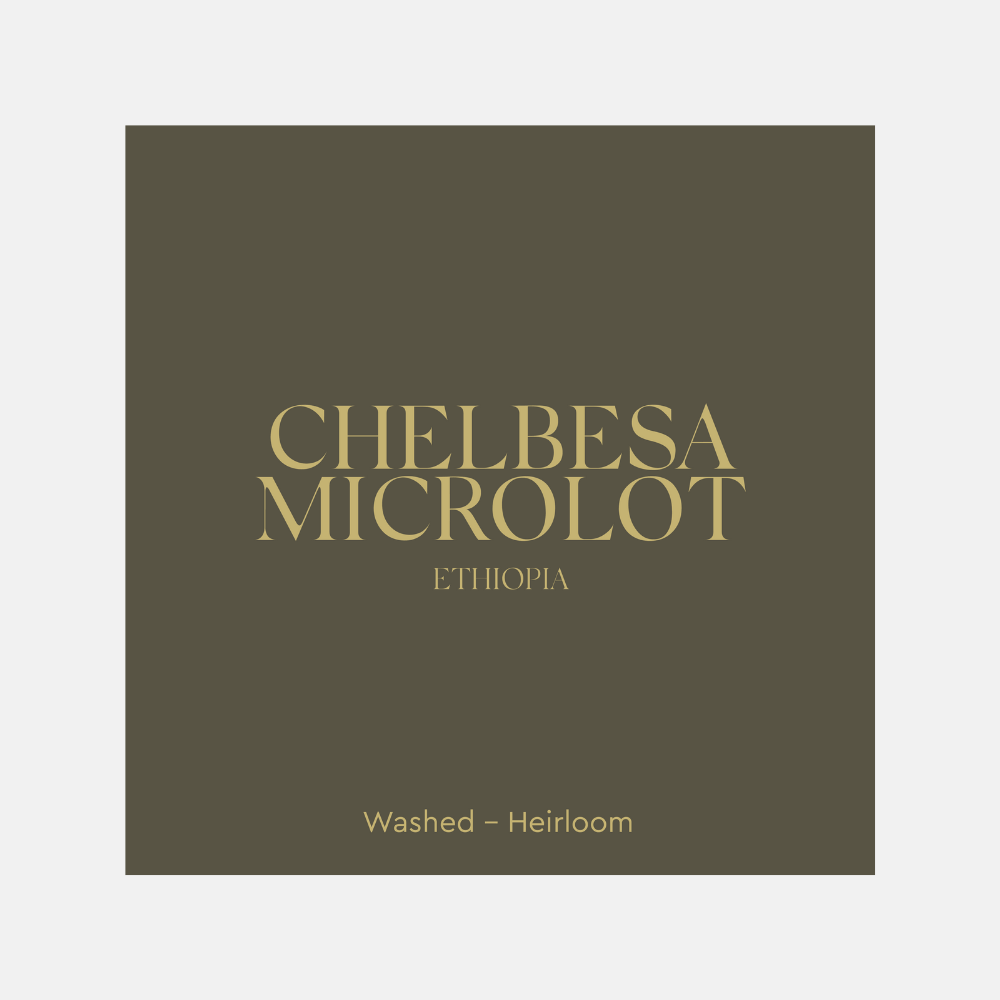All
Nafkot Admasu - Ethiopia
€16.80
Nafkot Admasu Ethiopia. Mixed Heirloom Varietals. Natural.
Every bean has a story
Nafkot Admasu owns a 2-hectare coffee farm in Gedicho, Yirgacheffe, a region renowned for producing some of Ethiopia's most exquisite coffees. Her farm is located at an altitude of 2170 m.a.s.l., an elevation crucial for the slow maturation of coffee cherries, which contributes to their complex flavor profiles.
Nafkot primarily cultivates Heirloom varieties. These varieties are highly prized for their distinct and nuanced flavors. While Nafkot uses organic farming practices, she has opted not to pursue organic certification due to the significant costs associated with the process. This is a common decision
among small-scale farmers in many coffee-growing regions, where the benefits of certification may not outweigh the financial burden.
During harvest, the processing station in Gedicho maintains a minimum of 7 permanent staff members and expands its workforce significantly to 190 employees during the harvest, which spans from November to January. This seasonal employment provides much-needed income for many families in the area.
Additionally, other small coffee farmers contribute their cherries to this lot. This further enhances the collective effort and supporting a broader network of local growers. Coffee is grown under the shade of false banana trees. The shade is crucial for optimal growth and flavor development. Beyond their role in coffee cultivation, false banana trees also serve as a significant local food source.
Once the coffee cherries get to the processing station, the team places them directly on raised beds for drying. This method is preferred for its ability to produce clean, bright, and fruit-forward coffee profiles. The cherries are spread evenly and dry for approximately 12-15 days. What is important, is that they cover the beds during the hottest hours (2 to 3 pm) to prevent rapid drying and potential cracking. They also do this at night to shield the beans from rainfall, which could reintroduce moisture and compromise quality.
This coffee project is supported by Ephtah, a company established to build sustainable collaborative supply chains for the benefit of customers, farmers, and their wider communities. It focuses on two main pillars:
Providing women with the skills and knowledge to enhance economic empowerment
Strengthening women’s voice and participation in decision making and leadership.
If you enjoy coffees from Ethiopia, we recommend you give our other Heirloom coffees, Chelbesa Microlot, a try!
Every bean has a story
Nafkot Admasu owns a 2-hectare coffee farm in Gedicho, Yirgacheffe, a region renowned for producing some of Ethiopia's most exquisite coffees. Her farm is located at an altitude of 2170 m.a.s.l., an elevation crucial for the slow maturation of coffee cherries, which contributes to their complex flavor profiles.
Nafkot primarily cultivates Heirloom varieties. These varieties are highly prized for their distinct and nuanced flavors. While Nafkot uses organic farming practices, she has opted not to pursue organic certification due to the significant costs associated with the process. This is a common decision
among small-scale farmers in many coffee-growing regions, where the benefits of certification may not outweigh the financial burden.
During harvest, the processing station in Gedicho maintains a minimum of 7 permanent staff members and expands its workforce significantly to 190 employees during the harvest, which spans from November to January. This seasonal employment provides much-needed income for many families in the area.
COFFEE PROCESSING
Additionally, other small coffee farmers contribute their cherries to this lot. This further enhances the collective effort and supporting a broader network of local growers. Coffee is grown under the shade of false banana trees. The shade is crucial for optimal growth and flavor development. Beyond their role in coffee cultivation, false banana trees also serve as a significant local food source.
Once the coffee cherries get to the processing station, the team places them directly on raised beds for drying. This method is preferred for its ability to produce clean, bright, and fruit-forward coffee profiles. The cherries are spread evenly and dry for approximately 12-15 days. What is important, is that they cover the beds during the hottest hours (2 to 3 pm) to prevent rapid drying and potential cracking. They also do this at night to shield the beans from rainfall, which could reintroduce moisture and compromise quality.
Women Inclusion and Empowerment
This coffee project is supported by Ephtah, a company established to build sustainable collaborative supply chains for the benefit of customers, farmers, and their wider communities. It focuses on two main pillars:
Providing women with the skills and knowledge to enhance economic empowerment
- Ephtah provides training programs around production and quality analysis to help improve women’s knowledge and confidence. This often leads to an improvement in their access to finance.
- Ephtah provides women with alternative sources of income through their Ama Commitment scheme.
Strengthening women’s voice and participation in decision making and leadership.
- Ephtah helps to create safe spaces for women in the communities they source from. They collaborate with local groups to encourage women in the community to become involved in local decision-making processes and leadership positions.
- The vast majority of the Ephtah management team are women.
If you enjoy coffees from Ethiopia, we recommend you give our other Heirloom coffees, Chelbesa Microlot, a try!
Read More
Read Less
Tasting notes
Imagine a yuzu ice-cream!
A floral and citrus-forward cup, with notes of jasmine, rose, and bergamot. Gentle layers of vanilla and honey add sweetness, balanced by a green tea–like delicacy. The juicy, medium-light body carries bright citric acidity, reminiscent of sweet lime and lemon, leading to a clean, lingering finish.
Recipe for espresso
Grams In: 19-19.5g
Grams Out: 40-45g
Extraction Time: 23-26’’
Temperature: 93-94 Celsius
Aged Best Use: Between 10-30 days
Recipe for filter
Hand brew: 15g coffee - 250ml water
Batch brew: 55g coffee - 1.000ml water
Total Brew Time: 2:00 - 2:30 min
Water Temperature: 90-93 Celsius
Aged Best Use: Between 7-30 days
Imagine a yuzu ice-cream!
A floral and citrus-forward cup, with notes of jasmine, rose, and bergamot. Gentle layers of vanilla and honey add sweetness, balanced by a green tea–like delicacy. The juicy, medium-light body carries bright citric acidity, reminiscent of sweet lime and lemon, leading to a clean, lingering finish.
Recipe for espresso
Grams In: 19-19.5g
Grams Out: 40-45g
Extraction Time: 23-26’’
Temperature: 93-94 Celsius
Aged Best Use: Between 10-30 days
Recipe for filter
Hand brew: 15g coffee - 250ml water
Batch brew: 55g coffee - 1.000ml water
Total Brew Time: 2:00 - 2:30 min
Water Temperature: 90-93 Celsius
Aged Best Use: Between 7-30 days
Read More
Read Less
Beans:
Whole Beans 250g
- Whole Beans 250g
- Ground for Espresso 250g
- Ground for Filter - Hand Brew 250g
- Ground for Filter - Cafetiere 250g
1
2
3
4
5
6
7
8
9
10

